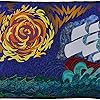MT
asked
Lauren Lee Merewether:
My wife shared an early copy of The Darkest Oath with me. I thought it was great. And I'm more of a sci-fi guy, but my one question is, where did the sorceress come from? I know it said she was the king's sorceress, but did kings have magic? I thought they executed people for practicing magic in the Middle Ages.
Lauren Lee Merewether
Hi! I’m so glad you enjoyed The Darkest Oath, and please thank your wife for sharing it! I love hearing when non-romance readers are drawn in.
Your question about the sorceress is a great one, and the answer is rooted in real history. You’re absolutely right: in the Middle Ages, "commoners" accused of practicing magic or sorcery were often executed, especially women. But kings and nobles? That was a different story entirely.
Historically, many rulers across Europe employed occult advisors (astrologers, alchemists, seers), people who dabbled in what we might now call magic, sorcery, or the “dark arts.” These individuals operated in the shadows of court life, offering their kings secret knowledge, predictions, or protection. They weren’t always officially recognized, but they were real. Think of figures like Nostradamus, a French seer and physician, who advised Catherine de' Medici.
So in The Darkest Oath, the sorceress is imagined in that tradition: not a wand-waving spellcaster like today's Merlin, but a powerful, secretive woman whose magic is deeply personal, mysterious, and morally ambiguous. Her title in the book, the king’s sorceress, is both a position of favor and isolation. Her curse on Rollant isn’t part of a larger magic system; it’s a one-time act of "twisted justice" granting him immortality as a reward for loyalty, but cursing love itself as the price.
That tension between belief and superstition, power and punishment felt truer to the spirit of the time than a structured magic system. I wanted her to feel more like a shadow of history than a character out of a high fantasy novel.
To me, the most terrifying kind of magic is the one without clear rules: the kind that punishes not your vices, but your virtues. A moral echo of the age, and Rollant is left to ponder for all eternity what chained him to immortal life. So, I put the reader in Rollant's shoes.
Thanks so much for reading, and for such a thoughtful question! I hope that is an acceptable answer for you.
And Spoiler Alert:
I did imply at the end of the book that she had intentionally chained her immortality to Rollant's, so when he chose what he chose, she essentially dies. But instead of explicitly stating it, to align with my original intent of mythic mystery, I left it unwritten.
Your question about the sorceress is a great one, and the answer is rooted in real history. You’re absolutely right: in the Middle Ages, "commoners" accused of practicing magic or sorcery were often executed, especially women. But kings and nobles? That was a different story entirely.
Historically, many rulers across Europe employed occult advisors (astrologers, alchemists, seers), people who dabbled in what we might now call magic, sorcery, or the “dark arts.” These individuals operated in the shadows of court life, offering their kings secret knowledge, predictions, or protection. They weren’t always officially recognized, but they were real. Think of figures like Nostradamus, a French seer and physician, who advised Catherine de' Medici.
So in The Darkest Oath, the sorceress is imagined in that tradition: not a wand-waving spellcaster like today's Merlin, but a powerful, secretive woman whose magic is deeply personal, mysterious, and morally ambiguous. Her title in the book, the king’s sorceress, is both a position of favor and isolation. Her curse on Rollant isn’t part of a larger magic system; it’s a one-time act of "twisted justice" granting him immortality as a reward for loyalty, but cursing love itself as the price.
That tension between belief and superstition, power and punishment felt truer to the spirit of the time than a structured magic system. I wanted her to feel more like a shadow of history than a character out of a high fantasy novel.
To me, the most terrifying kind of magic is the one without clear rules: the kind that punishes not your vices, but your virtues. A moral echo of the age, and Rollant is left to ponder for all eternity what chained him to immortal life. So, I put the reader in Rollant's shoes.
Thanks so much for reading, and for such a thoughtful question! I hope that is an acceptable answer for you.
And Spoiler Alert:
I did imply at the end of the book that she had intentionally chained her immortality to Rollant's, so when he chose what he chose, she essentially dies. But instead of explicitly stating it, to align with my original intent of mythic mystery, I left it unwritten.
More Answered Questions
Hans Kullberg
asked
Lauren Lee Merewether:
Thank you for posting a review, Lauren. From the bottom of my heart, I appreciate it and as a new author, I'm still learning how to get the word out. I see that you're an author as well - are there any insights that have helped you market your books? Thanks again! -Hans
A. Cari
asked
Lauren Lee Merewether:
Not really feeling the passage in your "Salvation in the Sun"... "Kiya's face was too dull and too brown to ever rival the bright and creamy tan of her [Nefertiti's] face..." It's one thing to have a dull face, I get it. But what does her color have to do with it? Why would that make her less attractive?
About Goodreads Q&A
Ask and answer questions about books!
You can pose questions to the Goodreads community with Reader Q&A, or ask your favorite author a question with Ask the Author.
See Featured Authors Answering Questions
Learn more





